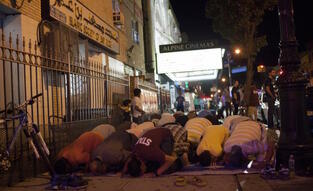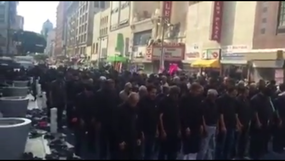Muslims are allowed to miss prayers.
They have the option to combine prayers, use optional prayer times, or do a 'make up' prayer for the one missed.
There is no need for prayer rooms at schools or workplaces.
They have the option to combine prayers, use optional prayer times, or do a 'make up' prayer for the one missed.
There is no need for prayer rooms at schools or workplaces.
Muslim prayers are extremely flexible and do not need to be cause for special rooms or break times at work or school.
Know the facts and fight with facts.
First, consider three of the five daily prayers that do not occur during the usual hours of work or school and therefore can be done at home or mosque. These are:
The pre-dawn prayer, called fajr (example: 5:30 a.m., but depends on the time of year and where you live)
The prayer just after sunset, called maghrib (example: 7:00 p.m., but depends on the time of year, etc.)
The final night prayer, called isha (around 8:00-10:00 p.m.)
What remains, and which are the ones used to force non-Muslims into creating prayer rooms in schools and the workplace, are the two afternoon prayers. These are: The prayer that is to be done just after noon (dhuhr), right after the sun has reached its peak in the sky, usually some time between 12:00-1:00; and, the late afternoon prayer (asr), usually some time between 4:00-5:00.
Here’s the most important facts Muslims will not tell you about the prayers.
Prayers can be missed if they are inconvenient, for example, if you are working or in a class during a prayer time. For people who miss a prayer, Islamic tradition allows the prayer to be made up later.
If a prayer is missed, Muslims are allowed to make it up later -- this is known as Qadaa.
The two afternoon prayers, as well as any prayer that is missed (say you overslept the dawn prayer), are allowed to be done later.
And you have options. You can combine the missed prayer with the next scheduled prayer. You can do both afternoon prayers at the same time, but choose the later time. For school children, this works well; the prayers can be done after school.
Also, there are two "optional" prayers, and you can do missed prayers as one of the "optional" prayers. The optional prayers can be used to replace any one of the five obligatory prayers.
You also have the option to do the two afternoon prayers in conjunction with another prayer at a later time (for example: you can do the dhuhr prayer with the after sunset prayer and the asr prayer with the final night prayer.
Using one or more of these options can be done indefinitely.
There is no need for prayer rooms at school or the workplace.
Moreover, one does not have to wait for the time of another prayer to ‘combine’ prayers. If you know you're going to miss a prayer time due to work or a class, or any other reason, you can make up a missed prayer any time of the day except the “prohibited times." The prohibited times are:
When the sun is rising.
When the sun is at its highest point in the day.
When the sun is setting.
According to Islamic Doctrine, when Muslims are in a non-Muslim land, they are to abide by the laws of that land until they are able to proceed with implementing their own laws and implement their Supremacy. Placing Islamic prayers rooms into American schools and workplaces is the beginning of implementing Supremacy.
In Muslim majority countries, Islamic Laws are implemented, which give Muslims more rights than non-Muslims. There is no equality among people according to Islam because the Quran states clearly than non-Muslims are not to have the same rights as Muslims.
According to Islamic Doctrine, Muslims are to have Supremacy over non-Muslims. In America exhibition of prayers at a non-Muslim workplace or school demonstrates their Supremacy.
Street prayers are also a way of displaying Islamic Supremacy. By blocking traffic, whether foot traffic or automobile, Muslims are demonstrating their belief in their Supremacy.
Muslim prayer rooms at American schools give non-Muslim students the belief that Islam is “special.” Non-Muslim children take notice that Muslims receive privileges that non-Muslim children do not receive. In some schools, Muslim children are allowed to get up and leave the classroom while the others must remain. Even during exams.
What message does this send to American children? It sends a message that Islam is Superior. And this is the purpose of prayer rooms at American schools. It also encourages conversions to Islam. It is a way of proselytizing.
The enforcement of Islamic prayer is a strategy of conquest.
The Saudi Arabian system is the system currently being used to spread Islam in the Western world. Their strategy of takeover is based on mutawwas, proselytizing. This system begins with the youth.
The Saudi tribe conquered Arabia in the early 1900s. They did this through the system of mutawwas, proselytizers. Islamic puritanism (following the Quran and the teachings of Muhammad) was forced upon people by the Saudi tribe:
"The prayers ... united men in the mosques and kept them under the control and spiritual discipline of the mutawwas. All stress was on obedience and it was imposed on them... Youth came under the control of the mutawwas... Performance of the five daily ritual prayers was made obligatory. When the the call to prayer sounded, police patrols with long canes would stride through the streets shouting: To prayer! and beat upon the closed shutters and doors of the shops in the markets to frighten any who might be hiding there. Those who did not walk in the direction of the mosque were helped on their way." ~~From An American Woman Living in Egypt: Life during an Islamic takeover.
Know the facts and fight with facts.
First, consider three of the five daily prayers that do not occur during the usual hours of work or school and therefore can be done at home or mosque. These are:
The pre-dawn prayer, called fajr (example: 5:30 a.m., but depends on the time of year and where you live)
The prayer just after sunset, called maghrib (example: 7:00 p.m., but depends on the time of year, etc.)
The final night prayer, called isha (around 8:00-10:00 p.m.)
What remains, and which are the ones used to force non-Muslims into creating prayer rooms in schools and the workplace, are the two afternoon prayers. These are: The prayer that is to be done just after noon (dhuhr), right after the sun has reached its peak in the sky, usually some time between 12:00-1:00; and, the late afternoon prayer (asr), usually some time between 4:00-5:00.
Here’s the most important facts Muslims will not tell you about the prayers.
Prayers can be missed if they are inconvenient, for example, if you are working or in a class during a prayer time. For people who miss a prayer, Islamic tradition allows the prayer to be made up later.
If a prayer is missed, Muslims are allowed to make it up later -- this is known as Qadaa.
The two afternoon prayers, as well as any prayer that is missed (say you overslept the dawn prayer), are allowed to be done later.
And you have options. You can combine the missed prayer with the next scheduled prayer. You can do both afternoon prayers at the same time, but choose the later time. For school children, this works well; the prayers can be done after school.
Also, there are two "optional" prayers, and you can do missed prayers as one of the "optional" prayers. The optional prayers can be used to replace any one of the five obligatory prayers.
You also have the option to do the two afternoon prayers in conjunction with another prayer at a later time (for example: you can do the dhuhr prayer with the after sunset prayer and the asr prayer with the final night prayer.
Using one or more of these options can be done indefinitely.
There is no need for prayer rooms at school or the workplace.
Moreover, one does not have to wait for the time of another prayer to ‘combine’ prayers. If you know you're going to miss a prayer time due to work or a class, or any other reason, you can make up a missed prayer any time of the day except the “prohibited times." The prohibited times are:
When the sun is rising.
When the sun is at its highest point in the day.
When the sun is setting.
According to Islamic Doctrine, when Muslims are in a non-Muslim land, they are to abide by the laws of that land until they are able to proceed with implementing their own laws and implement their Supremacy. Placing Islamic prayers rooms into American schools and workplaces is the beginning of implementing Supremacy.
In Muslim majority countries, Islamic Laws are implemented, which give Muslims more rights than non-Muslims. There is no equality among people according to Islam because the Quran states clearly than non-Muslims are not to have the same rights as Muslims.
According to Islamic Doctrine, Muslims are to have Supremacy over non-Muslims. In America exhibition of prayers at a non-Muslim workplace or school demonstrates their Supremacy.
Street prayers are also a way of displaying Islamic Supremacy. By blocking traffic, whether foot traffic or automobile, Muslims are demonstrating their belief in their Supremacy.
Muslim prayer rooms at American schools give non-Muslim students the belief that Islam is “special.” Non-Muslim children take notice that Muslims receive privileges that non-Muslim children do not receive. In some schools, Muslim children are allowed to get up and leave the classroom while the others must remain. Even during exams.
What message does this send to American children? It sends a message that Islam is Superior. And this is the purpose of prayer rooms at American schools. It also encourages conversions to Islam. It is a way of proselytizing.
The enforcement of Islamic prayer is a strategy of conquest.
The Saudi Arabian system is the system currently being used to spread Islam in the Western world. Their strategy of takeover is based on mutawwas, proselytizing. This system begins with the youth.
The Saudi tribe conquered Arabia in the early 1900s. They did this through the system of mutawwas, proselytizers. Islamic puritanism (following the Quran and the teachings of Muhammad) was forced upon people by the Saudi tribe:
"The prayers ... united men in the mosques and kept them under the control and spiritual discipline of the mutawwas. All stress was on obedience and it was imposed on them... Youth came under the control of the mutawwas... Performance of the five daily ritual prayers was made obligatory. When the the call to prayer sounded, police patrols with long canes would stride through the streets shouting: To prayer! and beat upon the closed shutters and doors of the shops in the markets to frighten any who might be hiding there. Those who did not walk in the direction of the mosque were helped on their way." ~~From An American Woman Living in Egypt: Life during an Islamic takeover.
Read the INTRODUCTION to Cheri's book
Read the Jacket Back
Purchase An American Woman Living in Egypt: Life during an Islamic takeover
at Amazon
Read the Jacket Back
Purchase An American Woman Living in Egypt: Life during an Islamic takeover
at Amazon

